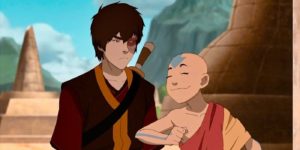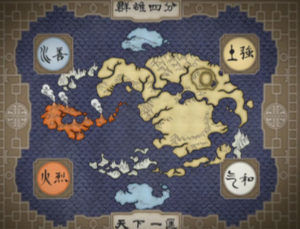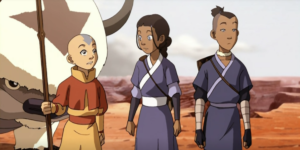The Kardashian's 'Pick Me' Brand of Empowerment on New Hulu Show
On their new show, The Kardashians, the famous family continues to use their personal lives as advertisements for thier billion-dollar businesses.
Incluvie Foundation Gala - Learn More
Amidst the pandemic, Avatar: The Last Airbender and its sequel Legend of Korra both returned to Netflix. At the time of their release, they ranked consistently in the platform’s top ten. The show’s success fifteen years after its 2005 premiere proves the enduring power of its storytelling. But Avatar is more than just a quality show. It may have well-rounded characters, serious subject matter, and detailed world-building, but it also offers timeless critiques of American society.
The Asiatic world of Avatar: The Last Airbender pays homage to Eastern culture. It’s a wise, culturally diverse children’s show that differs from the Western cultural monopoly in most American TV. Upon a 2020 viewing, viewers familiar with woke culture may wonder if this show, written by two white guys, might stray into the territory of cultural appropriation. But even in a time before allegations of cultural appropriation could cancel a show (Ah, 2005), the creators struck a careful balance and avoided it. They modeled each elemental “bending” discipline, in which characters can manipulate certain elements with their minds, after a specific martial arts discipline. They also incorporated Eastern wisdom into the characters’ arcs. However, the sensitive show still made a significant misstep.

While it creates an Asiatic world, the show casts mostly white voice actors. The Fire Nation, on the left of the map of the show’s fictional world, has light-skinned characters. Although its imperial spirit resembles Europe, its architecture mirrors Asia. The creator’s choice to make the Fire Nation’s characters light-skinned criticizes European colonialism, as, throughout the show, light-skinned characters assert their military strength and brutality against more peaceful peoples. The conflicts in this fantasy world, modeled after Asian cultures, disguises the story of European colonialism based on the voice acting. The creators stated they were drawing on Japanese, Chinese, Indian, and Inuit aesthetics — for the Fire Nation, Earth Kingdom, Air Nomads, and Water Tribes, respectively (SyFy).
Mark Hamil, who played Luke SkyWalker of Star Wars, voices the infamous Fire Lord in Avatar: The Last Airbender. It makes sense that the son of Darth Vader would play the imperial father figure in Avatar: a role reversal that establishes irony for adult viewers. However, this casting choice, while situating the show carefully in the fantasy/sci-fi canon, draws attention to the underlying whiteness of a show that attempts to pay homage to Eastern cultures.
The casting choices are even more egregious for the Water Tribes. With territories at the bottom and top of the map, the Water Tribes are darker-skinned than the Fire Nation. Conquered by the Fire Nation, and portrayed as less technologically advanced, their role parallels the Western perception of indigenous peoples. The writers even called the water peoples “tribes”: the Western label for indigenous groups. Using the plight of indigenous people to propel a plot, while casting white actors to play them, is the definition of cultural appropriation. It’s profiting off of someone else’s story without giving them a chance to share the wealth.

Beyond this misstep, the show’s critique of colonialism has helped it remain relevant. In a flashback, the Fire Nation’s imperial leader shares his reasoning for invading the other nations: “I want to share our greatness with the world.” This motive sounds a lot like the “white man’s burden” that motivated Europe to colonize and exploit the Global South under the guise of helping it. However, this critique of colonialism- that an attempt to share wealth becomes oppression- may not breach the American consciousness. Many Americans view colonialism as a past misstep of Europe, rather than something that America continually embodies. To this audience, the criticism of colonialism may feel aimed elsewhere.
Americans are entrenched in the same delusion as the show’s villainous Fire Nation. Americans don’t see themselves as conquerors. They see themselves as sharing prosperity, or, The American Dream, with non-Western peoples and people indigenous to the Americas. Americans will easily root for the whitewashed indigenous underdogs of Avatar, voiced by white actors who recite American idioms. But who do Americans really have more in common with, the show’s protagonists, or the Fire Nation?

Historically, Americans have viewed the British as the ruthless conquerors and oppressors, which is why the main character’s fight against the Fire Nation in Avatar: The Last Airbender tapped into a cultural vein in America. Americans have the ultimate underdog complex, even as the world’s biggest economic and military power. No wonder the rebels defeat a giant empire in every Star Wars movie. That’s the story Americans want to see.
Aang, the show’s titular Avatar, master of all four elements, survived a genocide committed by the Fire Nation against his people, the Air Nomads. Genocide and mass murder are common themes of colonialism. Maybe this show will plant an anti-colonial seed in Westernized, American kids, who remain ignorant to the fact that this rhetoric undermines their own existence. However, 15 years after its premiere, it seems the trojan-horse effect may have worked too well. Americans do not realize they are consuming a critique of their own country, and, despite Avatar‘s popularity, the show hasn’t spread anti-colonial sentiments. Although its critique of Western colonialism is hardly veiled, the show is known for its focus on the underdogs. Americans are too busy romanticizing their own past, rooting against Avatar’s literal redcoats, to understand that, to many, Americans are the redcoats. When will an Avatar restore balance in the real world, which currently leans heavily in favor of the West?
Related lists created by the same author
On their new show, The Kardashians, the famous family continues to use their personal lives as advertisements for thier billion-dollar businesses.
Related movie/TV/List/Topic
Yes, Asia is actually quite a large hub for amazing horror films even to this day, some people just never notice! Well, I'm here to change that. It's time to not let those words at the bottom of the screen scare you but instead be scared by some of the best horror you never knew about.